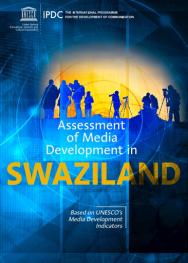Publication
Assessment of media development in Swaziland
ISBN : 978-92-3-100238-0 (print/pdf)
Collation : 133 p., illus.

The UNESCO Media Development Indicators (MDIs) are a universal tool for taking stock of national media development and identifying critical areas of media development. The MDIs were adopted in 2008 by the Intergovernmental Council of the International Programme for the Development of Communication (IPDC) and were seen as a vital tool in developing and enabling an environment for a free, independent, and pluralistic media. The Swaziland Chapter of the Media Institute of Southern Africa (MISA) partnered with UNESCO to assess the media landscape in the Kingdom of Swaziland in 2014 by applying the MDI framework.
This MDI assessment is the first of its kind to be conducted in the Kingdom of Swaziland in terms of its holistic approach and is the first comprehensive study to assess the national media landscape undertaken in the Kingdom by researchers since the adoption of the Constitution of the Kingdom Swaziland on 26 July 2005. This study aims to assess and gain an in-depth understanding of the Swaziland media landscape using the UNESCO MDIs.
The timing of the MDI study coincided with a tough year for journalists in Swaziland as the state clampdown on the media culminated in the arrest and conviction for two years, without an option of a fine, of The Nation editor Bheki Makhubu and columnist Thulani Maseko. Their incarceration came after the judge found them guilty of writing “scurrilous articles” that undermined the judiciary. When the current study was undertaken, the entire media community was still gripped by fear.






